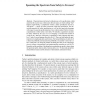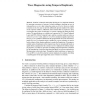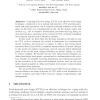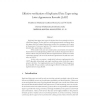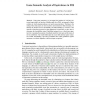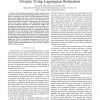96
Voted
ATVA
2015
Springer
9 years 10 months ago
2015
Springer
Inconsistent code detection is a variant of static analysis that detects statements that never occur on feasible executions. This includes code whose execution ultimately must lead...
83
Voted
ATVA
2015
Springer
9 years 10 months ago
2015
Springer
Of special interest in formal verification are safety specifications, which assert that the system stays within some allowed region, in which nothing “bad” happens. Equivalen...
171
Voted
ATVA
2015
Springer
9 years 10 months ago
2015
Springer
The reachability problem is one of the most important issues in the verification of hybrid systems. Computing the reachable sets of differential equations is difficult, although c...
112
Voted
ATVA
2015
Springer
9 years 10 months ago
2015
Springer
Runtime verification and model checking are two important methods for assessing correctness of systems. In both techniques, detecting an error is witnessed by an execution that vi...
102
Voted
ATVA
2015
Springer
9 years 10 months ago
2015
Springer
Combinatorial test design (CTD) is an effective test design technique, considered to be a testing best practice. CTD provides automatic test plan generation, but it requires a man...
86
Voted
ATVA
2015
Springer
9 years 10 months ago
2015
Springer
Replicated data types store copies of identical data across multiple servers in a distributed system. For the replicas to satisfy strong eventual consistency, these data types sho...
94
Voted
ATVA
2015
Springer
9 years 10 months ago
2015
Springer
Abstract. Using game semantics, we investigate the problem of verifying contextual equivalences in Interface Middleweight Java (IMJ), an imperative object calculus in which program...
103
Voted
ATVA
2015
Springer
9 years 10 months ago
2015
Springer
Abstract Infinite games with imperfect information tend to be undecidable unless the information flow is severely restricted. One fundamental decidable case occurs when there is ...
106
click to vote
ASYNC
2015
IEEE
9 years 10 months ago
2015
IEEE
Abstract—Asynchrony and concurrency are fundamental notions in the fields of asynchronous circuits as well as distributed systems. This paper treats asynchronous circuits as a s...
114
click to vote
ASYNC
2015
IEEE
9 years 10 months ago
2015
IEEE
—Gate sizing and threshold voltage selection is an important step in the VLSI physical design process to help reduce power consumption and improve circuit performance. Recent asy...

